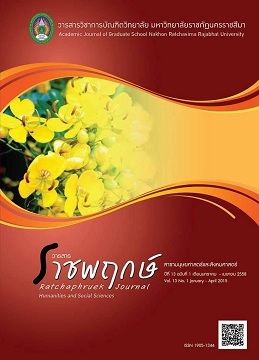Effects of Health Promoting Program on Health Behaviors among the Elderly Persons, Nonthaburi Province
Main Article Content
Abstract
The purpose of this quasi-experimental research was designed to examine the effects of health promoting program applying self-efficacy theory on health behaviors among the elderly persons, Nonthaburi province. The sample was a member of an elderly club by using simple random method. Thirty elderly persons from Tambol Bangpood club and thirty elderly persons from Tambol Bantalat club were assigned to experiment and comparison groups respectively. The experimental group received a health promoting program that includes knowledge, perceived self-efficacy and outcome expectation. A health behavior included food consumption, exercise, stress management and dental health care. The instrument was a questionnaire and a test of knowledge. The statistics used to analyze the research data were percentage, mean, standard deviation, paired t-test and independent t-test.
The results showed that;
1. The levels of knowledge, perceptions and expectations of elderly people before and after the health promotion program were different at the .05levelof significance.
2. Posttest of the experimental elderly group participating in the health promotion program showed an average score of health behaviors which was higher than before the experiment at the .05 level of significance.
3. Posttest of the experimental elderly group participating in the health promotion program had an average score of health behaviors higher than those who did not attend the program, at the .05 level of significance.
Article Details
References
นิภาพรรณ อธิคมานนท์. (2554). ผลของโปรแกรมส่งเสริมสุขภาพสำหรับผู้สูงอายุในชมรมผู้สูงอายุ อำเภอบางประหัน จังหวัดพระนครศรีอยุธยา. วิทยานิพนธ์สาธารณสุขศาสตรมหาบัณฑิต สาขาการสร้างเสริมสุขภาพ บัณฑิตวิทยาลัย มหาวิทยาลัยบูรพา.
ปานชีวา ณ หนองคาย. (2551). การพัฒนารูปแบบการเรียนรู้แบบมีส่วนร่วมเพื่อปรับเปลี่ยนพฤติกรรมสุขภาพผู้สูงอายุในจังหวัดอุดรธานี. ปริญญานิพนธ์ปรัชญาดุษฎีบัณฑิต สาขาวิชาสิ่งแวดล้อมศึกษา บัณฑิตวิทยาลัย มหาวิทยาลัยมหาสารคาม.
มูลนิธิสถาบันวิจัยและพัฒนาผู้สูงอายุไทย. (2550). รายงานสถานการณ์ผู้สูงอายุไทย พ.ศ. 2549. กรุงเทพฯ : โรงพิมพ์องค์การสงเคราะห์ทหารผ่านศึก.
ลิวรรณ อุนนาภิรักษ์ และคณะ. (2555). “ประสิทธิผลของโปรแกรมส่งเสริมสุขภาพต่อคุณภาพชีวิตผู้สูงอายุในชมรมผู้สูงอายุ”. วารสารพยาบาลศาสตร์ ปี 2555. 30(2) : 35-45.
สถาบันเวชศาสตร์ผู้สูงอายุ กรมการแพทย์. (2551). ระบบการดูแลสุขภาพผู้สูงอายุที่มีความเปราะบางด้านสุขภาพในชุมชน พ.ศ. 2551. กรุงเทพฯ : สถาบันเวชศาสตร์ผู้สูงอายุ กรมการแพทย์ กระทรวงสาธารณสุข.
สำนักงานพัฒนานโยบายสุขภาพระหว่างประเทศ. (2555). รายงานภาระโรคและการบาดเจ็บของประชากรไทย พ.ศ. 2552. นนทบุรี : เดอะกราฟิโก ซิสเต็มส์.
สำนักงานสถิติแห่งชาติ. (2550). รายงานการสำรวจประชากรสูงอายุในประเทศไทย พ.ศ. 2550. [ออนไลน์]. แหล่งที่มา : http://service.nso.go.th/nso/nsopublish/service/survey/rep_older50.pdf [22 ตุลาคม 2556].
สำนักงานคณะกรรมการพัฒนาเศรษฐกิจและสังคมแห่งชาติ. (2546). การคาดประมาณประชาชนของประเทศไทย พ.ศ. 2543-2563. กรุงเทพฯ : สำนักงานคณะกรรมการพัฒนาการเศรษฐกิจและสังคมแห่งชาติ.
Bandura, A. (1997). Social learning theory. New Jersey : Prentice-Hall.
Han, S. S. and others. (2005). “The effects of a health promotion program for elderly.” Taehan Kanho Hakhoe Chi. 35(6) : 1054-6.


